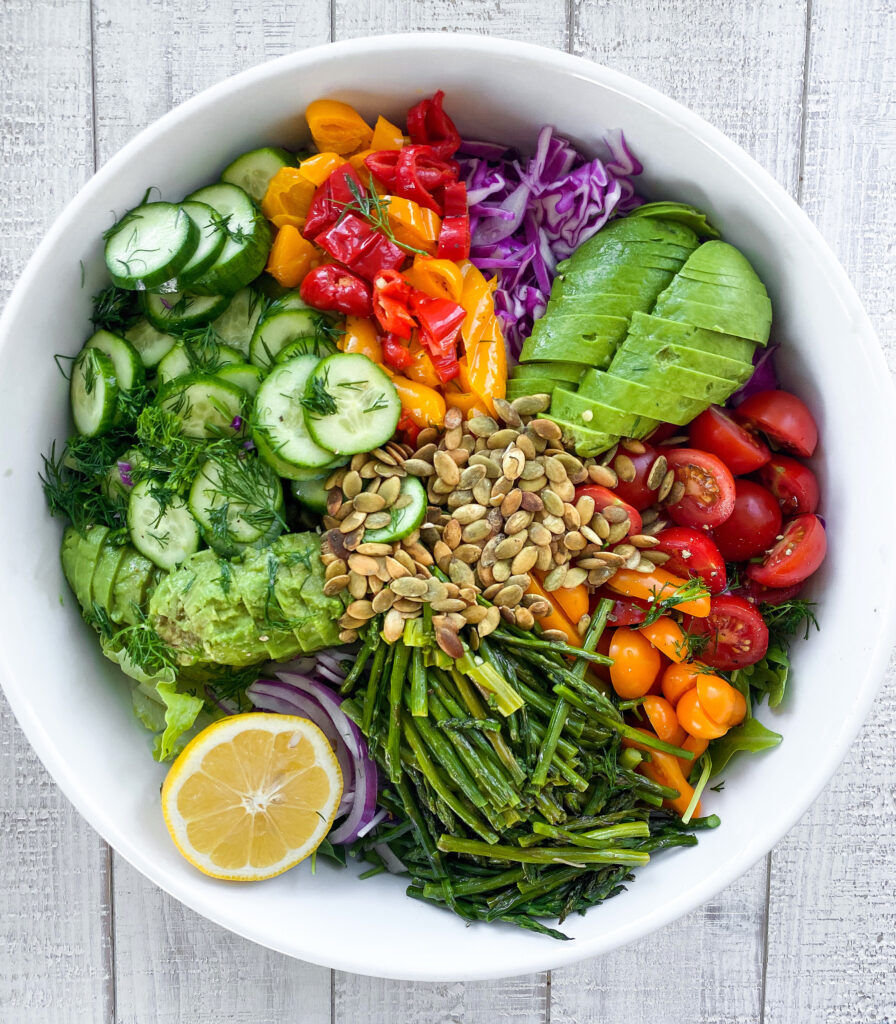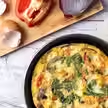How To Go Plantbased For Beginners (with a Nutritionist)
- Emma Lisa

- Mar 21, 2024
- 8 min read
Updated: Nov 14, 2024
If simply love the idea of better, wholefood nutrition from a more plantbased diet, eating more plants is a fabulously healthy way to lose unwanted kilos and deeply nourish your body. As a Nutritionist who is primarily plantbased herself, today I'm sharing how to go plantbased for beginners who want to eat better, reduce meat intake, and balance their body weight with plant power. Grab a green-tea lemon water and let's get into it!

Plantbased for beginners isn't as complicated or hard as you might think. In fact, there are many approaches to eating more plantbased foods that are simple to adopt and make part of your new normal. Today, I am sharing the simple way to ease into a plantbased diet for beginners that is a manageable, step by step approach...
FIND PLANTBASED MEALS: Browse Recipes →
Easy Plantbased Recipes for Beginners
Plantbased - especially in the Eat Nourish Glow universe - is all about teaching people how to eat from a flexible eating plan that simply focuses on making healthy meals based on plant food ingredients. This does process does not need to be compilated or involve a crazy lifestyle change, total pantry overhaul, or racing to the grocer for a massive shop. Instead, we focus on progress each day by simply adding in and consuming more veggies than processed foods, more plant protein than meat.
Why Go Plantbased?
Let me count the ways - the advantages of a more plantbased diet is huge. Plants are an excellent power-house of essential nutrients, including vitamins, minerals, and macros like protein and dietary fibre. Eating more plants can better help you maintain a healthy weight balance long term, and significantly reduce your risk of chronic diseases such as heart disease, diabetes, and some types of cancers. A plantbased diet also reduces the harm to our animal friends, if that is something you are passionate about, and is makes growing your own food a fun and eco-friendly pastime or hobby.
Getting Started Plantbased Eating
Plant powers unite! Getting started is easy; you don't even have to go all in right away to reap the benefits of a plantbased diet. Even small daily modifications can make a big difference in how you look and feel, and in a short amount of time. Here are a few pointers to get you started:
begin by purposefully adding more plantbased meals into your weekly menu
experiment with various vegetables, fruits, legumes, and whole grain to find what you like
swap ingredients such as almond milk instead of dairy milk, tofu or tempeh for meat
join my Meatless Mondays or create your own meat-free day with plantbased meals
bit by bit replace your pantry items once they run out with more plantbased items
make meal prepping a habit, you'll always have healthy plantbased meals on hand
find a plantbased support group or online community for inspiration and motivation
don't be shy to experiment when it comes to plantbased meal planning and cuisine
Transitioning to a more healthy diet, one rich in plantbased foods can be a fun experience if you look at it as a self-challenge or long term weight loss approach. You can go in as slow and easy as you like , or dive in full throttle with both feet. The secret to success is sticking with it, making changes you can maintain long term, and having fun with it all!

Try My Mini Wholefood Recipe Collection
Get this FREE recipe collection with healthy and delicious breakfast, lunch, and dinner recipes that nourish from the inside out. Each recipe is jam-packed with goodness and created by a qualified Nutritionist, for nutrition you can trust is good for you.
You Might Like
A Well-Balanced, Plantbased Plate

Building A Plantbased Plate
In order to get enough plant protein, you need to focus on variety and ingredient parings. This means adding several ingredients together such as peas and brown rice or quinoa to create a complete protein source.
Making a well-balanced plate such as Buddha Bowls, is a super easy way for beginner's to practise this while enjoying a filling and nutritious vegetarian or vegan feed at the same time.
Choosing Plantbased Nutrition
Whenever I talk about plantbased foods, clients always ask me what macros and food choices are most important. Given meat provides a hefty dose of lean protein all in one nutritional hit, when you go plantbased you need to consume a variety of plant food sources in order to get the same serving. Here's some easy way to practice this...
Legumes
Beans and lentils are an excellent plantbased protein and carbohydrate. Adding them to your plantbased plate provides sustenance and a balance of satiating protein. To reduce the natural gas caused by eating lots of beans and lentils, I recommend soaking canned beans or lentils before eating them, and give them a thorough rinse a few times. Here's few ideas to start with...
Beans: black beans, kidney, pinto, white beans, cannellini, chickpeas, adzuki, or lime beans
Lentils: green lentils, black, brown, green, or red lentils
Peas: green peas, split peas, yellow peas
Soybeans & Soy Products: non-GMO soybeans, edamame, tofu, tempeh, or Miso
Others: fava bean, lack-eyed peas, mung beans or bean
Legumes not only provide delicious plant protein, but they also offer essential nutrients like dietary fibre, vitamins, and minerals. Including a variety of legumes in your diet is an great way to balance your plate with wholefood protein from non-animal sources.
What To Shop For: most beans and peas are found canned and dry form, with the except of sprouts, fresh peas and green beans. Look for beans and peas that are "low in sodium" or have "no salt added", so be sure to read those nutrition labels. Whether you buy canned or dry are both, remember to soak or rinse them well!
Plantbased Healthy Whole-Grains
Whole grains are such an essential staple in the well-balanced plantbased diet, providing dietary fibre, essential nutrients, and a satisfying base for many dishes. Here's my top pick of healthy plantbased whole grains to experiment with in your meals. You only need a little such as 3 tbsp to 1/2cup, so use sparingly. If you are gluten-free (like myself), look for the GF to see if it is safe for you.
Barley: a chewy grain that adds texture and added fibre to any salad
Brown Rice (GF): a staple that works well as a high fibre base for salad bowls
Buckwheat (GF): despite its name, it's gluten-free and works great in salad bowls
Bulgur: precooked and quick to prepare, ideal for salads
Farro: a nutty and chewy grain often used in salads; high in fibre
Freekeh: roasted green wheat, offering a smoky flavour for various your salads
Quinoa (GF): a complete protein, rich in fibre and versatile for various dishes
Wild Rice (GF): nutty and aromatic, perfect in your salad bowl
What Shop For: most whole-grains are found in the sauces and pasta aisle, or the baking aisle. You may also find a few options in the health food sections of the grocery store. Many lifestyle and health food shops stock a wide variety of different grains you can browse.
Nuts & Seeds
Don't overlook nuts and seeds. These are both nutrient-dense additions to the plantbased diet, providing essential fats, protein, fibre, vitamins, and minerals. Here's a list of great additions to salads, stir fry, and your baking; just use them sparingly...
Nuts:
Almonds: a rich in vitamin E, magnesium, and healthy fats, excellent as a snack
Walnuts: high in omega-3 fatty acids and antioxidants, great for topping desserts
Cashews: deliciously creamy nuts that add a buttery texture to dishes
Pecans: sweet and crunchy, good fibre source and great in salads and desserts
Brazil Nuts: a great source of selenium, an essential mineral; eat in moderation
Hazelnuts: nutty and versatile, often used in desserts and spreads
Pistachios: lower in calories and high in protein, add to salads, oatmeal and desserts
Macadamia Nuts: butter-like nuts with a smooth texture, eat in moderation
Seeds:
Chia Seeds: packed with omega-3 fatty acids, fiber, and protein (see recipes)
Flaxseeds: high in fibre and omega-3s, often ground for better absorption
Sunflower Seeds: nutrient-rich seeds with a mild flavour
Pumpkin Seeds (Pepitas): a good source of iron, magnesium, and zinc.
Sesame Seeds: tiny seeds rich in calcium and healthy fats
Hemp Seeds: excellent source of plantbased protein and omega-3s
Poppy Seeds: tiny seeds used in baking and cooking
Sesame Seeds: small seeds with a rich, nutty flavour
Adding a variety of nuts and seeds into your plantbased meals adds texture, flavour, and a nutritional boost. Add them to other meals like snacks, smoothies, and main meals.
What To Shop For: when buying whole nuts, choose raw with the skin on or roasted. Avoid those that have been processed in any way to remove the skin, salted or enhanced with flavourings. When choosing a nut butter, be sure to look for simple ingredients —just the nut or seed, and salt (optional). Avoid any and all nut or seed butters that contain added sugar, thickeners or palm oil.
Plantbased Meat Alternatives
Plantbased isn't just feasting on primarily fresh vegetables and fruits, you also need to round out your meals with a balance of plant proteins. This will help to regulate your blood sugar levels, better support your weight loss and help you see results. Try these meat-free alternatives and suggestions:
Brown Rice & Peas: combine a 50/50 serving together to create a complete protein
Chia Seeds: beyond being high in omega-3 fatty acids, chia seeds are a protein boost
Edamame: young soybeans are not only delicious but also high in protein
Green Peas: peas are an excellent plant protein source and also high in fibre
Legumes: beans, lentils, and chickpeas are very good sources of protein
Lentils: red, green, or brown, lentils are protein and dietary fibre powerhouses
Protein Powder: choose hemp, soy, or a brown rice/pea combination for protein
Nuts & Seeds: almonds, peanuts, chia seeds, and hemp seeds are protein-rich choices
Quinoa: a complete protein grain, rich in essential amino acids and dietary fibre
Seitan: made from wheat gluten, seitan is a concentrated vegan protein source
Tofu & Tempeh: non-GMO soy products are vegan, versatile and protein-packed
Veggie Burgers or Loaves: made with high protein ingredients like beans and lentils
What To Shop For: plantbased meat alternatives are typically lower in saturated fat compared to animal proteins, especially red meat. They're also an easy way to get a large dose of protein on a budget compared to meat products. Look for fresh, canned or dry protein options, and avoid those pre-made vegan products that claim high protein.
You Might Like
Emma Lisa, Nutritionist & Women's Practitioner

Emma Lisa is a Nutritionist & Women's Health Practitioner with over 14+ years experience in wholefood nutrition, meal planning and health coaching. She is a published cookbook author, passionate food recipe creator and lifestyle blogger, and an advocate for women's health and anti-diet culture. When she's not in clinic, Emma is mum to five kids, in her test kitchen and a wellness digital creator. She lives in Sydney, Australia.
Healthy + happiness,
Emma Lisa xx
HEALTH & NUTRITION PRACTITIONER

If you enjoyed this post, I have a favour to ask?
Please take moment to write a review. Doing this helps me know you found value here on the blog and from this specific content. I work hard to share lots of free advice and recipes, and I would be truly grateful. Thank you so much!


























Commentaires